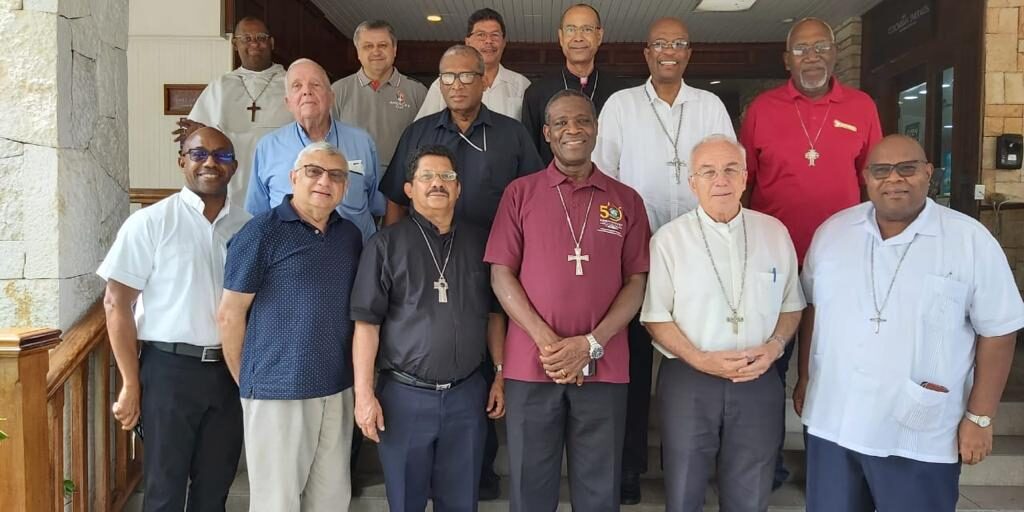‘Let’s talk about the Synod Synthesis’ was the topic of discussion for the Antilles Episcopal Conference’s (AEC) live Facebook conversation July 8. The session was moderated by AEC General Secretary Fr Donald Chambers. Guests were AEC President Archbishop Gabriel Malzaire of Castries and Synod Chair Bishop Clyde Harvey of St Georges-in-Grenada.
Asked to share on any ‘aha’ moments and on some of the emotions that the arch/bishops experienced from reviewing the feedback from the respective arch/dioceses, Bishop Harvey shared one of the areas that really struck him was the absence of the social teaching of the Church.
“That was really an ‘aha’ moment for me. Bishop Francis [Alleyne OSB of Georgetown] and Bishop Gerard County [St Vincent and the Grenadines] and myself, we just looked at each other and said ‘wow’ because we were reviewing what we had to look at and when we came …the same thing struck us…that Laudato Si’, Fratelli Tutti… some of the teaching in Populorum Progressio….it was very little reference to those things.”
Bishop Harvey explained that Archbishop Malzaire was “very right” in that concern for the poor is more at an individual level and that the structural elements “are not there”.
“I was also moved that the three of us immediately said ‘that is our fault as bishops. We have not taught God’s people, we have not put these documents front and centre’. If anything, some lay people, some Sisters, particularly, it’s the nuns who are carrying the social justice plaque,” Bishop Harvey said.
He surmised that the arch/bishops’ obligation to discern what the Spirit is saying to the Caribbean Church also involves acknowledging certain deficiencies “which we have to look at and which places a tremendous responsibility on us as bishops”.
Recently, the arch/bishops of the AEC met physically June 16–18 at St John’s-Basseterre, Antigua to “advance” the synod synthesis. At this meeting, they were responsible for reviewing the reports sent in by the 19 arch/dioceses.
Each arch/diocese is required to submit a synod synthesis of 10 pages which will form a final document of 190-pages.
Commenting on the purpose and significance of the synod synthesis, Bishop Harvey likened the synthesis process as a reduction.
He made the analogy of putting contents into a boiling pot. “But it’s going to be reduced and you hope in the reduction you get something better.”
Asked if there were any themes or concerns that stood out from the responses, Bishop Harvey responded, “some things obviously stood out”.
He explained it was clear that the respondents were eager to affirm the synod process itself. He mentioned some even went as far as to conclude that this was the first time they felt that the Church was listening to them.
“And one of the things that we saw very early o’clock was that people were seeing this synodal process not just as something we do now and finish. That this is something that has to be part of the essence of who we are as Church, and I think that was falling very much in line with the deeper understanding of synodality which has been articulated….” Bishop Harvey said.
Something new being born in Caribbean Church
Archbishop Malzaire highlighted that once the responses are collated, Fr Chambers will compile and distribute to the respective arch/diocese as a first draft.
“And then we’re expecting that they will give us some feedback before the final document is written to send to Rome,” he said.
Commenting further on this, Bishop Harvey added, “I think there is a general commitment among the bishops once we have agreement on that. What we have seen in some other places are that documents are being sent to Rome and then you see people saying, ‘hey that’s not what we said’. So, we decided that we need to get that other feedback from people.”
He underscored that the Caribbean Church cannot simply “sit back” and wait for some document to come from Rome after 2023.
Bishop Harvey spoke of a psychological and spiritual conversion that must come about if the Caribbean Church is to live synodality.
He spoke of an image which resonated within his group: a Caribbean woman giving birth. He shared that in the midst of the woman giving birth, there is a lot of pain and bawling. Sometimes, he said, there is hope and joy.
“A man holding the hand of his wife but in the Caribbean, the hand of his child’s mother, and really together aware that something really fantastic is happening and I would like to have that image of all of us holding hands as we walk down the road aware that something is being born among us and something that is important, not only for us as Catholics but if we do it well, it will be important for the whole region.”







